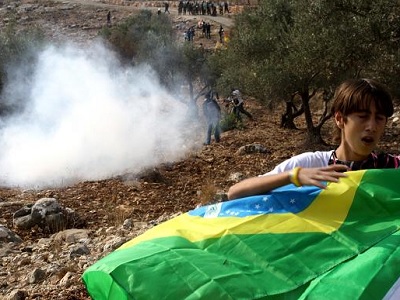علي الظفيري
17 أغسطس 2014
لا شكّ أن فكرة المقاومة، والأسئلة المثارة حولها، مسألة محورية في حياتنا العربية المعاصرة، وفي هذه الظروف الصعبة
والاستثنائية التي نعيشها. وبالمناسبة، لطالما كانت ظروفنا صعبة واستثنائية. أحاول، الآن، أن أتذكر متى كانت الظروف خلاف ذلك، ولا أنجح، ربما يسعفني أحدهم بظرفٍ عربي "طبيعي" وغير استثنائي. والمقاومة عملية وثيقة الارتباط بما نحن عليه، وما نطمح إليه، لها علاقة بمسألة الهوية العربية، وفهمنا ومعالجاتنا المختلفة لها، ومرتبطة بشرعية النظام العربي الرسمي القائم، وبقضية حاولنا مراراً، ولم ننجح، في تهميشها، أو إيجاد حلول غير عادلة لها، أو حتى الادعاء بأنها لا تعنينا بالشكل الذي يجب أن تكون عليه.
قبل الربيع العربي، وتحديداً في العقد الأخير، انتظمت حركتان رئيسيتان مقاومتان، هما حزب الله وحماس، في حلف الممانعة العربي، طهران ودمشق بشكل رئيسي، وقريباً منهما تركيا وقطر، وقد فتح ذلك شهية الاستفهام والاستنكار العربية في وجه الحركتين القويتين، حماس وحزب الله. أسئلةٌ بعضها منطقي، والأخرى ما أنزل الله بها من سلطان، والأسئلة "الهجومية"، وكأنها تفترض في معسكر الاعتدال العربي خندقاً قومياً عربياً ديمقراطياً مسانداً للمقاومة، فترى مَن يقول: كيف تكون المقاومة أداة في اليد الإيرانية؟ وكيف تتحالف المقاومة مع النظام المستبدّ في دمشق؟ فيما الطرف الآخر غير ديمقراطي بالمرّة، ولا مستقلاً عن الأجنبي وأجندته.
الجمهور العربي داعم للمقاومة، وهو واعٍ وغير طائفي، ولم يكن يفرّق بين حماس وحزب الله، مع وجود فوارق كبيرة بينهما، وكان الجمهور قابلاً لخياراتٍ سلبية اتخذتها حركات المقاومة، لسبب بسيط: هذه أفضل الخيارات المتاحة في ظل أجواء عربية رسمية معادية لفكرة المقاومة من أساسها. ولكن هذا الموقف الجماهيري الداعم، لم يكن مطلقاً وبلا شروط، بل موقفاً عقلانياً منطقياً غير مدفوع بالعاطفة، كما يُصَوَّر في الخطاب المناهض للمقاومة. والدليل، الفرز الذي حصل بعد ثورات الربيع العربي بين مقاومةٍ حقيقيةٍ، عبّرت عنها حركة حماس وفصائل المقاومة الفلسطينية، وبين حزب الله. لا يستطيع حزب الله، ولا المؤيدون له بشكل مطلق ومن دون نقاش، لومنا على موقفنا المناهض للحزب بعد الثورة السورية. فنحن، كجمهور عربي، وقفنا مع الحزب قلباً وقالباً قبل الثورات العربية، وعلى الرغم من كل التحفظات التي كانت تشوب تكوينه وأداءه، ليس لأننا لا نتمتع بحس النقد، ولا لنقص في المعلومات عنه، إنما لقناعتنا الكاملة بعدم وجود الخيارات الكافية للمقاومة، مَن يحمل البندقية ويواجه عدواً شرساً بهذه القوة، لا بدّ من تحالفٍ ما يحميه ويسانده.
وماذا تغيّر اليوم؟ هناك أشياء كثيرة تغيّرت، أولها أن حركة حماس لم تقبل الاستمرار في منظومةٍ تدعمها بشروط، وعلى حساب مبادئها وقيمها وجمهورها. خرجت من دمشق وقطعت مع طهران، لا يمكن الاستمرار في تحالفٍ عدوٍّ للإنسان العربي وحياته وحريته وكرامته، وهذا ما لم يفعله حزب الله الذي انخرط في عملية المواجهة مع العربيِّ ومشروعه لصالح الإيراني. نعم، كل مشروع حزب الله تم تجييره لصالح العدو، وما هي الحجة؟ إنها ضرورات حماية المقاومة وتأمينها، وهو ما أسقطته فصائل المقاومة الفلسطينية، الشهر الماضي، الأمر الذي نبّهنا إليه عزمي بشارة في حواره التلفزيوني أخيراً، وقد فات الكثير منا، إذ طرح الاستفهام الكبير حول مبرّر حماية المقاومة وتأمينها، وكيف أن حركتي حماس والجهاد الإسلامي قادتا المواجهة بشكل غير مسبوق، ومن دون دمشق وحزب الله وطهران، وبوجود نظام السيسي المعادي لها بشكل يفوق عداء النظام السابق في مصر أيام مبارك، كان حزب الله يؤمن دوره ووظيفته، لا مقاومته كما يدعي.
المقاومة في وجه إسرائيل قضية مركزية، وكل محاولات تهميشها وتسخيفها وعرض أضرارها لم ولن تنجح. سقط حزب الله من المعادلة بشكل كبير، لكن المقاومة وحركاتها وجمهورها لم يسقط، ولا أعرف إن كان لدى الحزب فرصة العودة والتكفير عن الجرائم التي ارتكبها، كل ما أعرفه أن الفكرة لن تموت، وكل محاولاتنا للتغيير لن تكون بدون المقاومة، أو بعيداً عنها.







